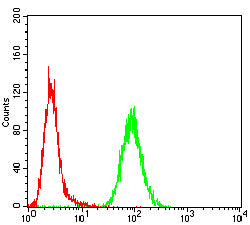
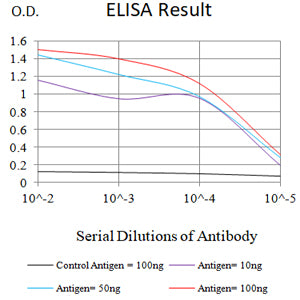
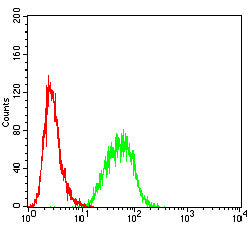
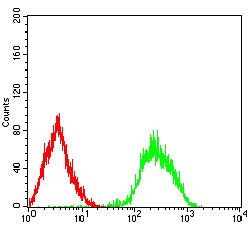
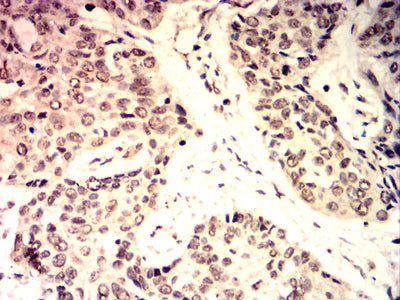
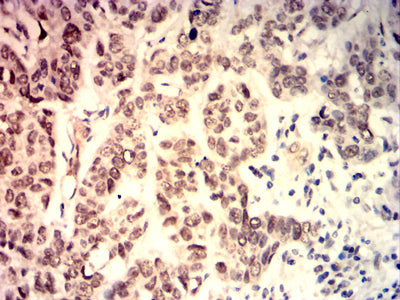
| WB | 咨询技术 | Human,Mouse,Rat |
| IF | 咨询技术 | Human,Mouse,Rat |
| IHC | 1/200-1/1000 | Human,Mouse,Rat |
| ICC | 技术咨询 | Human,Mouse,Rat |
| FCM | 1/200-1/400 | Human,Mouse,Rat |
| Elisa | 1/10000 | Human,Mouse,Rat |
| Aliases | MRTL; MYCC; c-Myc; bHLHe39 |
| Entrez GeneID | 4609 |
| clone | 6H11F6 |
| WB Predicted band size | 32.1/57/48.8kDa |
| Host/Isotype | Mouse IgG1 |
| Antibody Type | Primary antibody |
| Storage | Store at 4°C short term. Aliquot and store at -20°C long term. Avoid freeze/thaw cycles. |
| Species Reactivity | Human |
| Immunogen | Purified recombinant fragment of human C-MYC (AA: (290-439)) expressed in E. Coli. |
| Formulation | Purified antibody in PBS with 0.05% sodium azide |
+ +
以下是3篇关于C-MYC抗体的代表性文献及其摘要概括:
1. **文献名称**: "MYC antibody-based immunohistochemistry in human neoplasms"
**作者**: Smith-Sørensen B, et al.
**摘要**: 该研究评估了C-MYC抗体在多种肿瘤组织中的免疫组化检测效果,发现其在Burkitt淋巴瘤和神经母细胞瘤中高表达,提出其可作为MYC驱动肿瘤的辅助诊断标志物。
2. **文献名称**: "Targeting MYC with modular synthetic transcription repressors"
**作者**: Chen YJ, et al.
**摘要**: 开发了一种基于C-MYC抗体片段的新型合成转录抑制系统,通过靶向MYC蛋白的DNA结合域,成功在体外降低肿瘤细胞增殖活性,为MYC靶向治疗提供新策略。
3. **文献名称**: "Antibody-based detection of MYC phosphorylation in breast cancer"
**作者**: Horwitz E, et al.
**摘要**: 研究利用特异性C-MYC磷酸化抗体,揭示了乳腺癌中MYC蛋白Thr58/Ser62位点的异常磷酸化模式,证实其与肿瘤侵袭性和化疗耐药性的相关性。
注:以上为根据公开研究领域概括的示例文献,实际引用时建议通过PubMed或Web of Science检索具体文献。如需真实文献,可补充说明具体研究方向(如诊断应用/机制研究)。
The C-MYC antibody is a crucial tool in molecular and cancer research, targeting the C-MYC oncoprotein, a key regulator of cell proliferation, differentiation, and apoptosis. The *MYC* gene encodes this transcription factor, which dimerizes with MAX to bind DNA at E-box motifs, activating or repressing target genes involved in cell cycle progression, metabolism, and ribosome biogenesis. Dysregulation of C-MYC—through amplification, translocation, or signaling pathway activation—is implicated in over 50% of human cancers, including breast, lung, and hematological malignancies.
C-MYC antibodies are widely used to detect and quantify C-MYC protein expression in techniques like Western blotting, immunohistochemistry (IHC), immunofluorescence (IF), and flow cytometry. They help assess oncogenic activity, study MYC-driven tumorigenesis, and evaluate therapeutic responses in preclinical models. Common antibody clones (e.g., 9E10. Y69) recognize specific epitopes, often within the N-terminal transactivation domain or C-terminal regulatory regions. Some antibodies distinguish between phosphorylated or unmodified forms, aiding functional studies. However, challenges include cross-reactivity with related MYC family proteins (e.g., N-MYC, L-MYC) and variability in performance across experimental conditions. Despite this, C-MYC antibodies remain indispensable for understanding MYC's role in cancer biology and developing targeted therapies.
×